#like..niche christian discourse but there was NO good reason to change it from 'and also with you' to 'and with your spirit'
Text
we have the coronation on (a family decision, not mine) and bleh the homily is making me gag. 'righteous power and authority' stfu
#personal#also realising i havent experienced a church service in any way in many years and im not enjoying it one bit#thankfully we're watching it just out of interest not out of support#like i wish we werent giving them higher viewership but at least the rest of the family isnt sitting here loving it#we're all just mocking it#and me and my sister are pointing out all the bits of the mass where they changed the language to dad#that was like..a decade ago but it's not like he's been to church in that time either#like..niche christian discourse but there was NO good reason to change it from 'and also with you' to 'and with your spirit'
1 note
·
View note
Text
13 Music Podcasts You Should Be Listening to Right Now
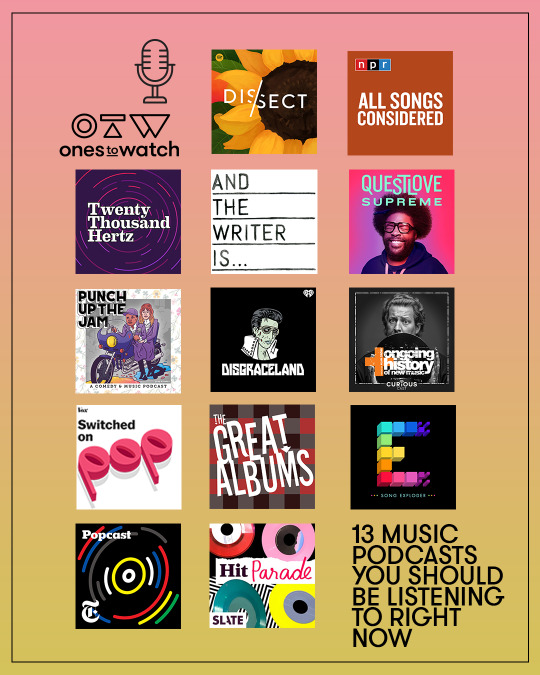
In case you haven’t quite got the memo, Spotify is for a lot more than streaming Billie Eilish and a playlist made up of lo-fi chill beats on repeat. The past few years have witnessed a veritable boom of podcasts, from both self-made creators and massive media outlets, covering a whole spectrum of topics and niche interests. As someone who has listened to over 70 hours of “The Adventure Zone,” a Dungeons & Dragons podcast hosted by three brothers and their dad, in spite of never having once thought of actually playing a game of D&D, it is safe to say this is no passing fad.
Podcasts exist as an inside look into a host of worlds you never once considered exploring, and this goes equally true for music podcasts. From in-depth examinations of your favorite artists and their works to dramatized true crime–style narratives of legendary artists, these are the music podcasts you need to be listening to right now.
Also, if you needed even more music podcasts in your life, did you know Ones To Watch has its own battle-style podcast where four tracks enter the ring and only one leaves victorious?
Switched on Pop
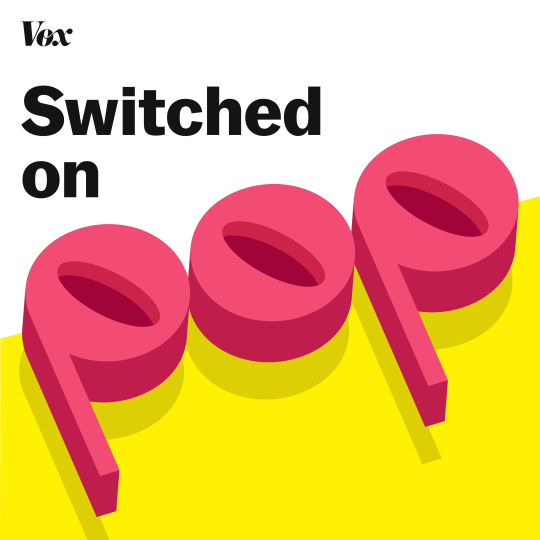
There is no escaping pop music, so you may as well enjoy, examine, and eventually begin to understand why exactly it is so popular. At least, that’s the ethos behind musicologist Nate Sloan and songwriter Charlie Harding’s phenomenal podcast. Each episode sees the duo breaking down pop songs to posit the question of what makes a song like “bad guy” or “Old Town Road” a hit, and what is their cultural significance in the music landscape at large? Balancing lighthearted humor with critical analysis, Switched On Pop is a podcast that will have you loving music you never knew you liked in the first place.
Where to Start: “Billie Eilish is a Different Kind of Pop Star (ft. FINNEAS)”
Dissect

Dissect is a music nerd’s dream podcast. Hosted by Cole Cuchna, the hit podcast series is rare in that rather than jumping from topic to topic with each episode, each season of “Dissect” holds a magnifying glass to one prolific work of one seminal artist. From the mythos of Frank Ocean, Kendrick Lamar’s To Pimp a Butterfly, Kanye West’s My Beautiful Dark Twisted Fantasy, Ms. Lauryn Hill’s The Miseducation of Lauryn Hill, to Tyler, The Creator grappling with his sexuality on Flower Boy, there is no shortage of reasons of why you need to be listening to Dissect.
Where to Start: “S4E14 - Epilogue: IGOR”
Song Exploder

Song Exploder may just be the best interview series in existence, largely due to the podcast functioning as less of a traditional interview series and more as a vivid recollection of artist’s most heartfelt work. The podcast series features musicians from all walks of life, from Fleetwood Mac’s Lindsey Buckingham to Bon Iver’s Justin Vernon, taking apart a single one of their songs piece by piece. It is akin to your grandparents recounting one of their fondest memories to you, if your grandparents just so happened to be world-renowned artists.
Where to Start: “Maggie Rogers - Alaska”
Disgraceland

In the wake of the massive popularity of True Crime podcasts like “Serial,” Disgraceland marries all there is to love about rock star worship and a culture’s obsession with the seedier aspects of the human condition. Blending music history, true crime, and transgressive fiction, Disgraceland is a dramatized retelling of some of music’s most enthralling criminal stories. Imagine the already engrossing stories of Tupac Shakur and The Notorious B.I.G. or Kurt Cobain and Courtney Love, albeit told through an exhilarating and entertaining modern-noir lens.
Where to Start: “Amy Winehouse: Rehab, the Muse and a Rare Talent”
And The Writer Is…with Ross Golan

Have you ever wondered who is the person behind some of your favorite songs? Then And The Writer Is… is the podcast for you. Each episode takes you behind the closed doors of the music and into the songwriting room with some of the greatest songwriters and creatives of our generation. If you love anything by any of today’s biggest artists, then chances are they have probably appeared on an episode of And The Writer Is… to provide an inside glimpse into their creative process.
Where to Start: “EP 54: Ben Gibbard (Death Cab For Cutie)”
Questlove Supreme

You shouldn’t be listening to Questlove Supreme just because its host is none other than the infamous Questlove (although that would honestly be more than enough reason for us). For starters, Questlove Supreme arguably features some of the best guests out of any other podcast out there. Ever wanted to hear John Oliver talk about his transition from The Daily Show to shaping people’s political opinions regularly? Or ever wondered about Michelle Obama’s first musical memories? Then, good news, because Questlove Supreme has all you could ever need and so much more.
Where to Start: “Ep. 113 feat. Michelle Obama”
Twenty Thousand Hertz

Twenty Thousand Hertz is likely the most prominent outlier on this list. That is not to say this is not a podcast of note, equally as deserving of your precious listening hours; Twenty Thousand Hertz simply does not address music or artists in the traditional sense. Rather, this is an examination of the sounds, the sonic textures, and the crucial building blocks that have allowed artists to create works that truly move people. Twenty Thousand Hertz is not just for music lovers, but for those who appreciate the perfectly intangible idea of sound as a simultaneously human-constructed and natural concept.
Where to Start: “#72 | 808”
Punch Up The Jam
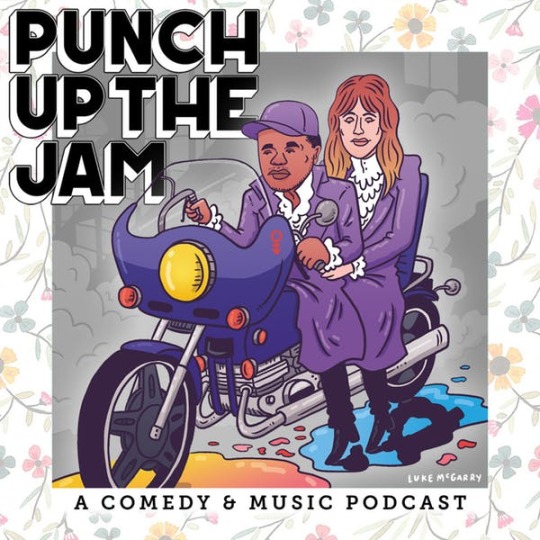
Punch Up The Jam is a comedy and music podcast. How does that work exactly? Well, comedians and best friends Miel Bredouw and Demi Adejuyigbe invite one of their equally hilarious friends to attempt to fix a popular song, despite having absolutely no qualifications so to speak of. Laughs are had, chaos ensues, and more laughs are had as Punch Up The Jam begs the question: do you need to know anything about music to improve a hit song?
Where to Start: 77 - “Kiss From a Rose (w/ Travis McElroy)”
All Songs Considered

It would be impossible to create a definitive list of music podcasts without mentioning NPR's All Songs Considered. The nearly 20-year-old series has grown with the times, evolving from a lauded radio show to an award-receiving podcast. The generation-spanning medium for music discovery is hosted by Bob Boilen and Robin Hilton, and often features a range of guests that makes this already much-celebrated podcast into essential listening material.
Where to Start: “All Songs Rewind: The Worst Songs Of All Time?”
Hit Parade

For Hit Parade, the phrase “it’s a smash” is more than just A&R short-hand for any passing song they hear in mid-production; it is the genesis of music history. Produced by Slate, pop chart analyst Chris Molanphy seeks to uncover what exactly it was that made a song a number one smash. More than just a terribly informative music podcast, Hit Parade changes up its formula through bouts of trivia, music snippets, and enthralling storytelling.
Where to Start: “The Oh. My. God. Becky Edition”
Popcast
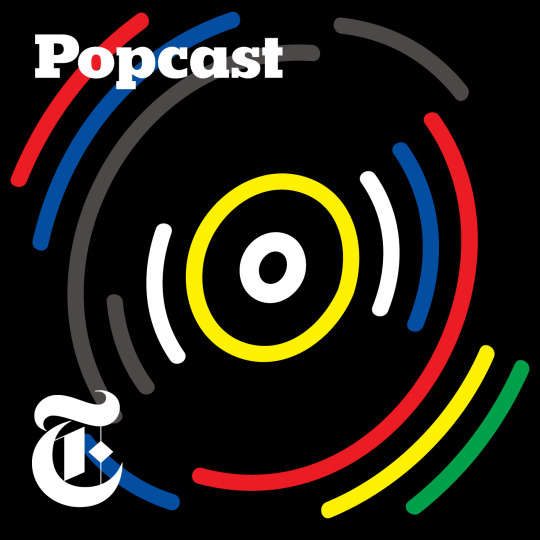
The best way to understand the very notion and ever-changing minutia of popular music is Popcast. Hosted by New York Times pop critic Jon Caramanica, Popcast homes in on not just what is trending on the Billboard charts but what is trending, period. From Taylor Swift and Scooter Braun’s ongoing civil war, the perplexing economics of the streaming era, to how memes can create bonafide artists, Popcast is what you need to be listening to in order to sound erudite at your next dinner party, even if you find yourself in spirited discourse over Lil Nas X.
Where to Start: “How Many Streams Is a T-Shirt Worth? Breaking Down Chart Dilemmas.”
Ongoing History of New Music
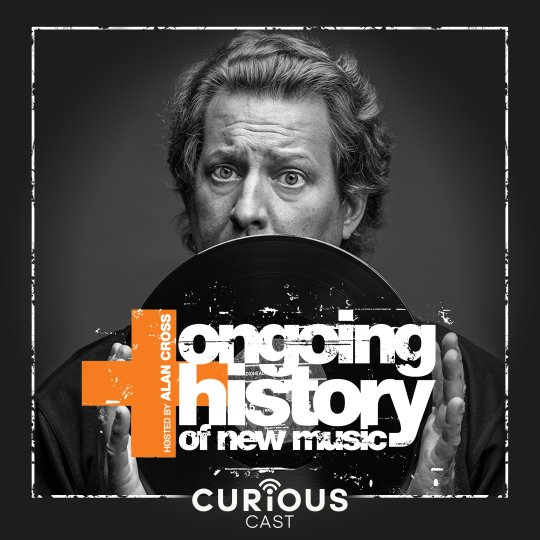
This next podcast is dedicated to all our lovely Canadian readers, or really anyone who is looking for an enlightening deep dive into music’s most notable artists and movements. Hosted by legendary Canadian radio broadcaster and music journalist Alan Cross, Ongoing History of New Music is Canada’s most well-known music documentary series. Featuring artists profile from the likes of Radiohead to Twenty One Pilots, narrative journeys of everything from Christian Rock to Britpop, and even the etymology behind some of music’s most elusive terminology, Ongoing History of New Music is a musical history wellspring.
Where to Start: “Stories Behind Songs”
The Great Albums

The Great Albums is a podcast series wholly true to its name. In unexpected yet utterly delightful fashion, co-hosts Bill Lambusta and Brian Erickson delve into some of pop, rock, and beyond’s greatest moments and musical accomplishments. More than just a track by track review of a seminal work from the likes of Jay-Z, Joni Mitchell, and Sufjan Stevens, The Great Albums is an examination of the notion of fandom and how that love affair is expressed through the lens of the prolific album.
Where to Start: “Radiohead - OK Computer”
#switched on pop#dissect#song exploder#disgraceland#and the writer is#questlove supreme#twenty thousand hertz#punch up the jam#all songs considered#hit parade#popcast#ongoing history of new music#the great albums#podcast#music podcast
3 notes
·
View notes
Text
Chilling effects
Chilling effects
John Biggs 1 day
The removal of conspiracy enthusiast content by InfoWars brings us to an interesting and important point in the history of online discourse. The current form of Internet content distribution has made it a broadcast medium akin to television or radio. Apps distribute our cat pics, our workouts, and our YouTube rants to specific audiences of followers, audiences that were nearly impossible to monetize in the early days of the Internet but, thanks to gullible marketing managers, can be sold as influencer media.
The source of all of this came from Gen X’s deep love of authenticity. They formed a new vein of content that, after breeding DIY music and zines, begat blogging, and, ultimately, created an endless expanse of user generated content (UGC). In the “old days” of the Internet this Cluetrain-manifesto-waving post gatekeeper attitude served the slacker well. But this move from a few institutional voices into a scattered legion of micro-fandoms led us to where we are today: in a shithole of absolute confusion and disruption.
As I wrote a year ago , user generated content supplanted and all but destroyed “real news.” While much of what is published now is true in a journalistic sense, the ability for falsehood and conspiracy to masquerade as truth is the real problem and it is what caused a vacuum as old media slowed down and new media sped up. In this emptiness a number of parasitic organisms sprung up including sites like Gizmodo and TechCrunch, micro-celebrity systems like Instagram and Vine, and sites catering to a different consumer, sites like InfoWars and Stormfront. It should be noted that InfoWars has been spouting its deepstate meanderings since 1999 and Alex Jones himself was a gravelly-voice radio star as early as 1996. The Internet allowed any number of niche content services to juke around the gatekeepers of propriety and give folks like Jones and, arguably, TechCrunch founder Mike Arrington, Gawker founder Nick Denton, and countless members of the “Internet-famous club,” deep influence over the last decades media landscape.
The last twenty years have been good for UGC. You could get rich making it, get informed reading it, and its traditions and habits began redefining how news-gathering operated. There is no longer just a wall between advertising and editorial. There is also a wall between editorial and the myriad bloggers who write about poop on Mt. Everest . In this sort of world we readers find ourselves at a distinct loss. What is true? What is entertainment? When the Internet is made flesh in the form of Pizzagate shootings and Unite the Right Marches, who is to blame?
The simple answer? We are to blame. We are to blame because we scrolled endlessly past bad news to get to the news that was applicable to us. We trained robots to spoon feed us our opinions and then force feed us associated content. We allowed ourselves to enter into a pact with a devil so invisible and pernicious that it easily convinced the most confused among us to mobilize against Quixotic causes and immobilized the smartest among us who were lulled into a Soma-like sleep of liking, sharing, and smileys. And now a new reckoning is coming. We have come full circle.
Once upon a time old gatekeepers were careful to let only carefully controlled views and opinions out over the airwaves. The medium was so immediate that in the 1940s broadcasters forbade the transmission of recordings and instead forced broadcasters to offer only live events. This was wonderful if you had the time to mic a children’s choir at Christmas but this rigidity was bed for a reporter’s health. Take William Shirer and Edward R. Murrow’s complaints about being unable to record and play back bombing raids in Nazi-held territories – their chafing at old ideas are almost palpable to modern bloggers.
There were other handicaps to the ban on recording that hampered us in taking full advantage of this new medium in journalism. On any given day there might be several developments, each of which could have been recorded as it happened and then put together and edited for the evening broadcast. In Berlin, for example, there might be a bellicose proclamation, troop movements through the capital, sensational headlines in the newspapers, a protest by an angry ambassador, a fiery speech by Hitler, Goring or Goebbels threatening Nazi Germany’s next victim—all in the course of the day. We could have recorded them at the moment they happened and put them together for a report in depth at the end of the day. Newspapers could not do this. Only radio could. But [CBS President] Paley forbade it.
Murrow and I tried to point out to him that the ban on recording was not only hampering our efforts to cover the crisis in Europe but would make it impossible to really cover the war, if war came. In order to broadcast live, we had to have a telephone line leading from our mike to a shortwave transmitter. You could not follow an advancing or retreating army dragging a telephone line along with you. You could not get your mike close enough to a battle to cover the sounds of combat. With a compact little recorder you could get into the thick of it and capture the awesome sounds of war.
And so now instead of CBS and the Censorship Bureau we have Facebook and Twitter. Instead of calling for the ability to record and playback an event we want permission to offer our own slants on events, no matter how far removed we are from the action. Instead of working diligently to spread only the truth, we consume the truth as others know it. And that’s what we are now chafing against: the commercialization and professionalization of user generated content.
Every medium goes through this confusion. From Penny Dreadfuls to Pall Mall sponsoring nearly every single new television show in the 1940s , media has grown, entered a disruptive phase that changes all media around it, and is then curtailed into boredom and commoditization. It is important to remember that we are in the era of Peak TV not because we all have more time to watch 20 hours of Breaking Bad. We are in Peak TV because we have gotten so good at making good shows – and the average consumer is ravenous for new content – that there is no financial reason not to take a flyer on a miniseries. In short, it’s gotten boring to make good TV.
And so we are now entering the latest stage of Internet content, the blowback. This blowback is not coming from governments. Trump, for his part, sees something wrong but cannot or will not verbalize it past the idea of “Fake News”. There is absolutely a Fake News problem but it is not what he thinks it is. Instead, the Fake News problem is rooted in the idea that all content deserves equal respect. My Medium post is as good as a CNN which is as good as an InfoWars screed about pedophiles on Mars. In a world defined by free speech then all speech is protected. Until, of course, it affects the bottom line of the company hosting it.
So Facebook and Twitter are walking a thin line. They want to remain true to the ancillary GenX credo that can be best described as “garbage in, garbage out” but many of its readers have taken that deeply open invitation to share their lives far too openly. These platforms have come to define personalities. They have come to define news cycles. They have driven men and women into hiding and they have given the trolls weapons they never had before, including the ability to destroy media organizations at will. They don’t want to censor but now that they have shareholders then they simply must.
So get ready for the next wave of media. And the next. And the next. As it gets more and more boring to visit Facebook I foresee a few other rising and falling media outlets based on new media – perhaps through VR or video – that will knock social media out of the way. And wait for more wholesale destruction of UGC creators new and old as monetization becomes more important than “truth.”
I am not here to weep for InfoWars. I think it’s garbage. I’m here to tell you that InfoWars is the latest in a long line of disrupted modes of distribution that began with the printing press and will end god knows where. There are no chilling effects here, just changes. And we’d best get used to them.
from Christian David Biz https://ift.tt/2OmzvCi via Article Source
0 notes